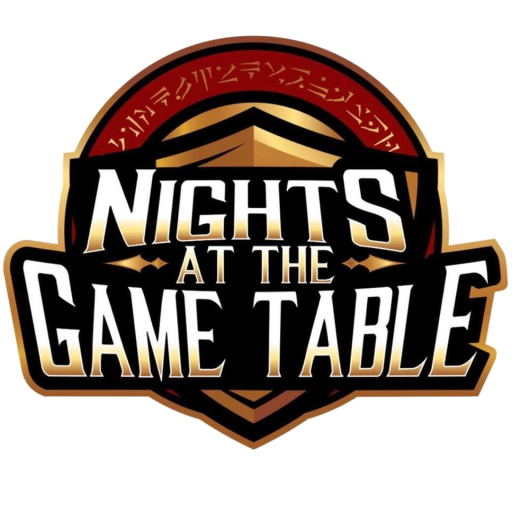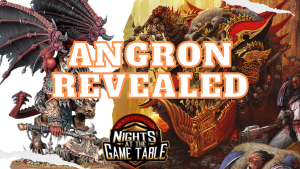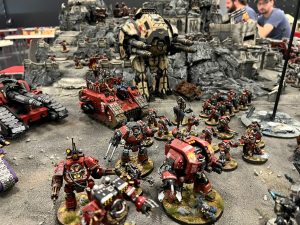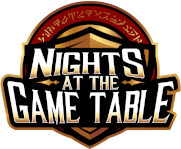In this week’s edition of Mind Games, I want to look in a slightly different direction than we have in recent weeks. Rather than looking at how to outsmart our opponents, instead we’re going to look at how to be a good opponent other players look forward to seeing across from them.
In doing, I want to touch on a misconception about tournament play, particularly at the highest level and at the top tables, and what it takes to reach and compete at that level.
Too often people assume that success in tournament play requires perfect play and being a stickler for rules, order of operations, and otherwise playing and expecting a perfectly played game of 40k from you and your opponent.
This translates to the idea that players have to be ruthless and cut throat in approaching the rules and their opponent’s play in order to compete.

Generally speaking, this is not the case in the slightest, both because of what it truly means to be competitive and because the tournament community is smaller than some might think.
In its ideal state, competitive play is fueled by a desire to face off against a worthy opponent and emerge victorious through superior play. A truly competitive player seeks to test their mettle, not win (or lose) on a technicality. As such, most competitive players and tournament regulars are not going to be sticklers for hardline interpretations of rules and order of operations.
If you were to ask, most tournament players I know and have met would say they would not want to “win like that,” and while they of course want to win, having a good game enjoyed by both sides is preferable.

In addition to winning fairly being more desirable from a grander philosophical perspective, there’s also the reality that the tournament community is not all that big. Much as a regular in the local game store gets to know the other players in their area, anyone who participates in the tournament community long enough will get to know many of their competitors and form friendships based on a mutual interest in the game and respect for each other as players.
Both of these factors, the desires to prove worth through superior play and be part of a larger community, tie in to the idea of mutual respect, which is often more prevalent at the higher echelons of competitive tournament play than people expect. Experienced tournament goers generally recognize each other, and even when they don’t, most operate with a level of respect for their opponent, recognizing that they’re likely more or less equally knowledgeable about the game, the rules, and how to play with a bit of pace to complete games in a timely fashion.
So what does it take, on a game mechanics level, to be a good opponent?
First off, is just the golden rule: treat others as you wish to be treated. Respecting an opponent includes respecting the situation you are both in and not being a stickler about technicalities. A prime scenario is allowing an opponent to go back to complete an action out of phase. Generally, this is acceptable within the next phase (or two if one of the phases was largely skipped like a psychic phase with one or no psykers) particularly when it’s patently obvious to both players the action that was overlooked. For example, if my opponent moved a combat unit to just outside an inch of one of my units in an isolated corner of the board, but we began resolving other combats, I would generally allow them to make their obviously telegraphed charge move and engage that combat.

What this scenario doesn’t include is if, halfway through their shooting phase, my opponent realizes they forgot to move a unit and want to move it to be in range of a target, but during their movement phase would have other potential targets and factors for that unit to consider in their movement. This is a bit of a hazy scenario, and there is no hard and fast line of what is and isn’t acceptable as a “take back” action.
Just as offering take backs is a sign of respect, so is refusing them when offered on your behalf. That is, if I realize I forgot something borderline, maybe two phases ago, or that could have been done differently, even if my opponent offers for me to go ahead and take that action, if I would have hesitation offering that take back to my opponent, I’m not going to take it when offered. Going with this is not “keeping score” or requesting borderline take-backs. Just because I allowed my opponent to charge with a unit that clearly was intended to charge after the fight phase began doesn’t give me a right to ask my opponent to allow me to cast a smite I forgot on a unit after my shooting failed to kill the last model.
Connected to what is and isn’t an acceptable take back to offer is the idea of intent, and playing by intent. There is no hard and fast line on what is and isn’t acceptable as inferred intent, and so it is best to communicate any and all intent. This is a very important concept to gather with intent; it must be communicated in most situations. Our game of 40k is one that relies on precise measurements with imprecise tools in a potentially unstable environment. Models fall over, scenery gets bumped, and yet the precise location of a model relative to other models (or objectives) is very important.
As such, a good rule of thumb is to always announce intent and verify with an opponent a shared understanding of where models are positioned. For example, if I charge a unit standing near a character, I will announce my intent to stay outside of 3” of that character, and verify it is possible with my opponent. Otherwise, if don’t announce that intent and I complete my charges, when my opponent checks and sees his character is just within 3” from his perspective and wants to heroically intervene, we have a bit of an awkward situation where one of us may end up feeling our opponent is being a bit disingenuous. Announcing intent after an opponent is looking to act on a situation is not playing by intent but hoping to use it as an escape for mistakes.

Advising someone interested in going to a tournament for the first time can be difficult, in no small part because of the difficulty in weighing advice on how to enjoy yourself and have a good time against advice on how to avoid bad situations and protect yourself from the rare but ever-ominous “that guy” opponent. We want anyone going to an event to be able to defend themselves from someone taking advantage and getting more than they should either in take backs or in bending or breaking rules, even if this scenario is rare. The best advice I can give is to communicate openly, which includes asking questions on anything that seems off or unclear.
This gets me to my last bit of advice for being a good opponent: politely questioning your opponent and asking for clarification is not rude. Similarly, asking for a judge to make a ruling is not rude. Many players hesitate to do both because they don’t want to be confrontational. Asking an opponent to clarify a rule, or a measurement, does not have to be rude. In almost every instance where I have asked an opponent to clarify a rule or to re-measure something that seemed off to me, one of us was mistaken. If it was a measurement my opponent is likely rushing a bit and just wasn’t being careful – there was likely no malicious intent, and simply asking for them to recheck is not an accusation there was. Similarly, asking for a judge ruling when neither player can quickly find the rule in question is just more expedient than going back and forth with an opponent and digging through rule books.
Being a good opponent at a tournament is no different than being a good opponent in a game with a friend or at the local shop: Communicate frequently and openly so both players have a shared understanding of the game state; allow for mistakes to happen and rectify them as best you can for both parties; and stand up for yourself and make sure you understand anything that seems unclear. Doing these three things should allow you to do the most important thing expected of a good opponent: have fun!

Warhammer 40k Winning Lists June 11th Edition
With summer in full swing, we see a refreshing number of tournaments kick back up globally, ranging from 3 to 7 rounds



